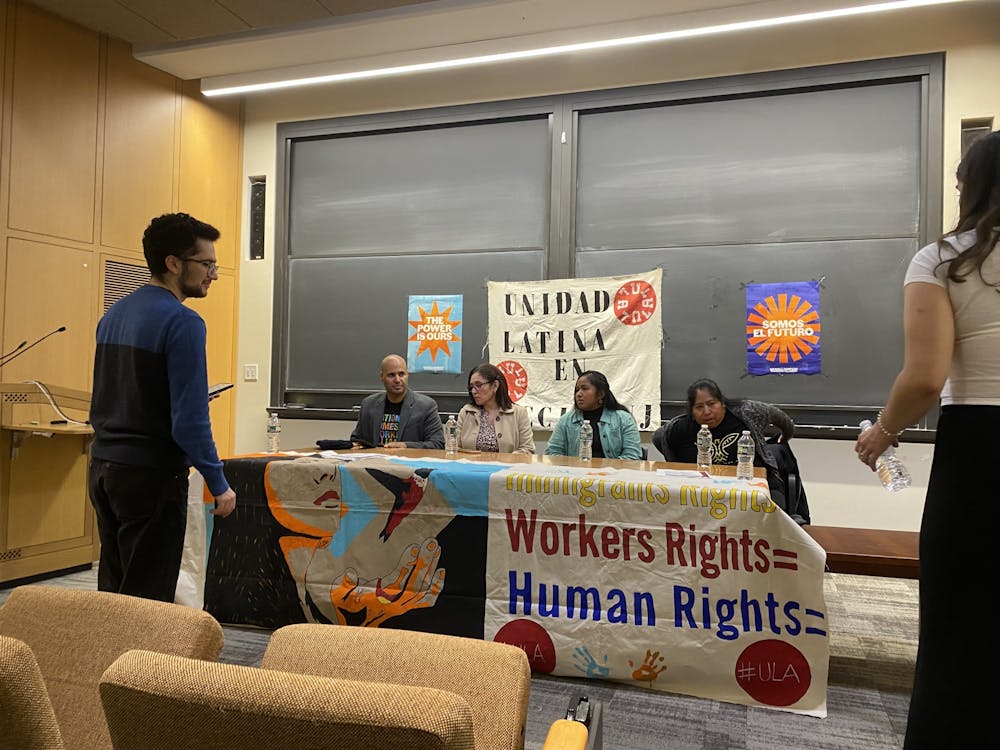Students for Prison Education, Abolition, and Reform hosted a panel on the NJ Domestic Workers’ Bill of Rights on Nov. 30.
The Princeton community was joined by members of the local grassroots group Unidad Latina en Acción (ULA) and five panelists. These panelists included two head organizers with the National Domestic Workers Alliance (NDWA) and three domestic workers. The panel comes amid workers’ rights movements across the country, particularly among domestic workers.
ULA has been organizing around protecting immigrants and low-income communities since 2009. Founded at a protest on the International Day of Workers’ Rights that year, ULA organizes against the criminalization of immigrants and low-income workers by U.S. Immigration and Customs Enforcement (ICE) in municipalities across the country.
Virgilio Aran, an organizer at NDWA, said at the talk that exploitation is a major hurdle because of the informal nature of domestic work.
“We think exploitation doesn’t happen now but it clearly does,” explained Evelyn Saz, another organizer with the NDWA.
Panelist Leticia Garcia of Lazos de América explained that domestic work is “recognized as legitimate and should have the same benefits as other lines of work.”
In New Jersey alone, there are 50,000 domestic workers, the panelists said. Many are immigrants and can face threats of deportation for something as simple as asking for water or food.
“Domestic work is a fundamental part of society and it is unacceptable that many employers won’t pay enough or give breaks,” Garcia said.

The first domestic worker bill of rights was passed in New York in 2010. Since then, nine states have passed domestic workers’ bills of rights. Currently, there are campaigns pushing for it in DC and New Jersey. The New Jersey bill’s main goals are to include the same safety provisions other jobs have, to get domestic workers included in anti-discrimination laws, and to institute contracts in order to counter the rampant wage theft experienced by domestic workers. On Dec. 1, the New Jersey bill S723 was referred to the Senate Budget and Appropriations Committee. Panelist Angela Ramos of ULA explained that her employer added work hours and expected more labor without ever increasing pay.
The main opposition to this bill comes from businesses, elder care facilities, and au pair agencies who “want to exploit workers” to gain more profit, as explained by Virgilio. Domestic work in elder care facilities is one of the fastest-growing industries, as our population is rapidly aging. Virgilio explained that it is “our job as a community to make sure that every single worker gets rights” because “historically when one group is left behind, everyone is left behind.”
Saz explained that “domestic work is legitimate work that is maybe not taught in university, but requires hours of practice.”
ULA began joint events with the University community with a panel hosted last year about the Values Act, which aimed at restricting ICE interaction with police and public institutions. The connection was strengthened with students from both the School of Public and International Affairs and the Asylum Project becoming involved with ULA’s various campaigns, including their annual May Day march and weekly food distribution.

Alan Plotz ’25, one of the event organizers, became involved with ULA through food distribution and Princeton Mutual Aid. “I think the ‘Orange Bubble’ is a myth. There are people in Princeton who are so clearly affected by immigration work,” he said. “If you go two blocks behind Nassau street that is where ULA meets and where they do food distribution.”
Angela Ramos also explained that, among those affected by the bill, some work as nannies and caregivers for faculty and staff connected to the University.
SPEAR’s immigration committee will soon begin English as a second language (ESL) classes with ULA. ULA organizers emphasized the importance of student involvement in spreading their message and showing political support through phone banking and sending letters to legislators.
The event was held in East Pyne 010 at 7:30 p.m. on Thursday, Nov. 30.
Abby Leibowitz is a News Contributor for the ‘Prince.’ Please direct any corrections requests to corrections[at]dailyprincetonian.com








